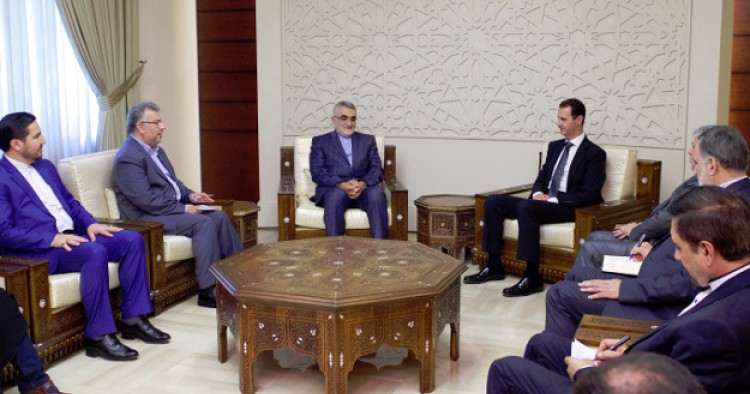Earlier today, a senior Iranian lawmaker said the United States and its allies have failed in Syria and the broader region and credited Supreme Leader Ali Khamenei’s leadership for defeating Iran’s “enemies” in foreign lands to safeguard the country’s national security. “Despite all acts of sabotage, the signs of the defeat of America and Saudi Arabia in Syria and Yemen are evident,” Alaeddin Boroujerdi, the chairman of the Iranian parliament’s national security and foreign policy committee, said in a meeting with senior cleric Hossein Nuri-Hamedani. “Syria was the first bulwark of resistance. If it was broken, Lebanon and Iraq would have easily collapsed and the Islamic Republic’s borders would have been seriously threatened.”
Heading a parliamentary delegation to the Iranian holy city of Qom, Boroujerdi also met with other top clerics. In a meeting with Ayatollah Jafar Sobhani, the senior lawmaker also claimed that Iran’s missile power serves as a deterrent against any military attack against the Islamic Republic. He, however, warned that the government authorities must be vigilant that the 2009 post-election unrest does not repeat itself as Iran is preparing for next month’s presidential polls.
Comment: Iranian leaders, including Supreme Leader Khamenei, often try to justify their costly military adventurism in foreign wars at the cost of domestic priorities, by arguing that Iranian forces have to neutralize enemy threats in neighboring countries to avoid their infiltration inside Iran’s territory. “If the ill-wishers and subversive elements that are proxies of enemies, America and Zionism, had not been dealt with there [in Syria], we would have had to confront them in Tehran, Fars, Khorasan and Isfahan,” Khamenei said in a meeting with the families of Iranian military personnel killed in Syria in January.
When the Islamic Revolution Guards Corps (I.R.G.C.) and its Lebanese ally Hezbollah initially began their military intervention in Syria, they tried to keep their activities largely covert. But as the war dragged on and intensified, and the number of Iranian and Hezbollah casualties soared, it became impossible for Tehran and Hezbollah to conceal their direct involvement anymore. Instead, they began to shape the narrative that fighting in Syria and Iraq serves national security interests of Iran and Lebanon. As Boroujerdi’s comment indicates, Tehran also sees Syria as “a primary bulwark of resistance” against Israel and its regional rivals.
The Middle East Institute (MEI) is an independent, non-partisan, non-for-profit, educational organization. It does not engage in advocacy and its scholars’ opinions are their own. MEI welcomes financial donations, but retains sole editorial control over its work and its publications reflect only the authors’ views. For a listing of MEI donors, please click here.












